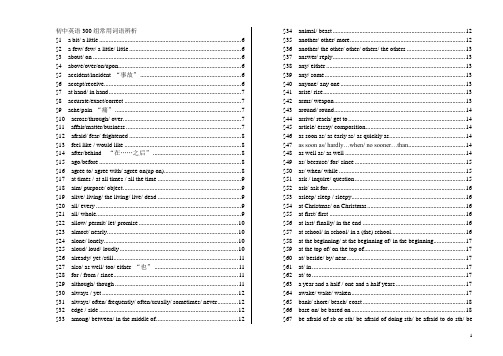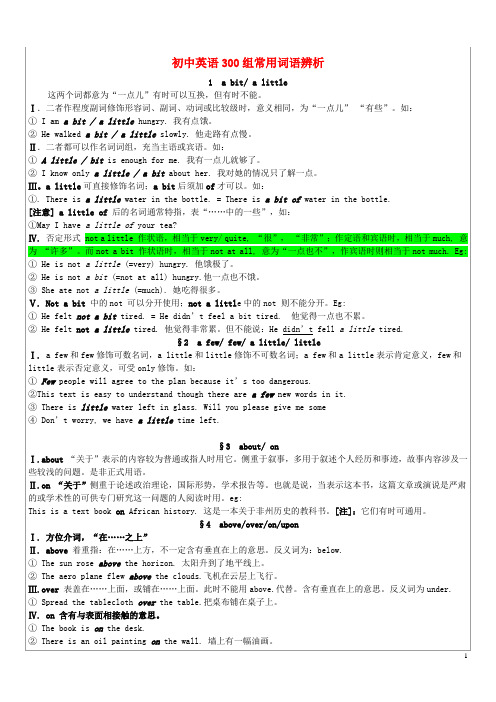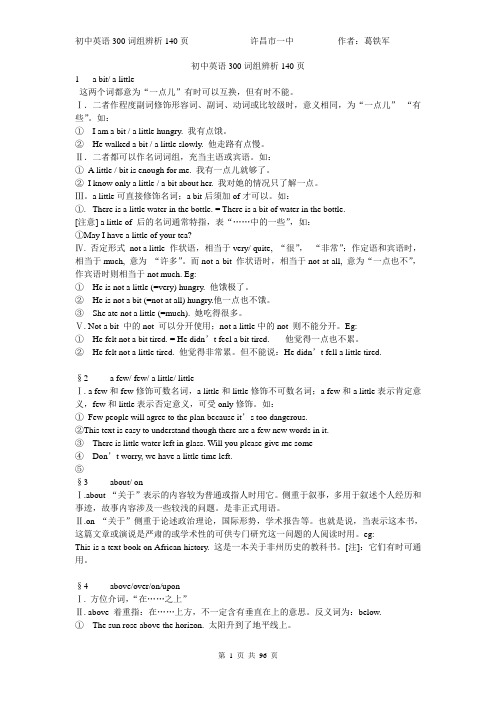☆ 初中英语300组常用词语辨析
- 格式:doc
- 大小:1.61 MB
- 文档页数:140

初中英语300组常用词语辨析Lesson495.bloom/flower/blossomⅠ.bloom指观赏用的花。
如:玫瑰;菊花;牡丹等。
Ⅱ.flower是普通用语。
Ⅲ.blossom指果树上的花。
96.boat/shipⅠ.boat“船、艇,”是普通用语。
主要指用浆、篙、帆或引擎的小船、小艇,但有时也指大轮船。
如:1We crossed the river by boat.我们乘船过河。
2They pulled the boat up on to the shore.他们把这条船拖上了岸。
(指小船③When does the boat leave for Shanghai?(指轮船Ⅱ.ship“船、舰,”多指大的航海船只。
如:1The ship is at sea.船厂在航海。
2They went to Guangahou by ship.他们乘船去广州。
97.bold/brave/courageousⅠ.bold“大胆的、勇敢的”着重指大胆、勇敢的气质,表现出有胆量、敢闯或敢于对抗而不畏缩。
如:1Be bold!勇敢些!2It’s very bold of us to v enture to go to sea.我们冒险航海是很勇敢的。
Ⅱ.brave“勇敢的”,应用最广泛,通常指在危险、困难或可怕的情况下表现勇猛而畏缩。
如:1Be brave!勇敢些!2It was brave of him to enter the burning building.他敢进入那燃烧着的房屋,真是勇敢。
Ⅲ.courageous“勇敢的,无畏的”表示由于有勇敢的气质或不屈不挠的精神而能无畏地自觉地对付某种事情,常常用于表示道义上的勇敢。
如:1He is courageous in telling the truth.他敢于讲实话。
2We hope that they will courageously shoulder their responsibilities and overcome all difficulties.我们希望能够勇敢地负起责任,克服一切困难。

初中英语300组常用词语辨析完整版(1) 初中英语300组常用词语辨析完整版(1)内容摘要:Lesson11. a bit/ a little这两个词都意为”一点儿有时可以互换,但有时不能。
Ⅰ.二者作程度副词修饰形容词、副词、动词或比较级时,意义相同,为”一点儿“有些。
如① I am a bit / a little hungry. 我有点饿。
② He walked a bit / a little slowly. 他走路有点慢。
Ⅱ.二者都可以作名词词组,充当主语或宾语。
如① A little / bit is enough for me. 我有一点儿就够了。
② I know only a little / a bit about her. 我对她的情况只了解一点。
Ⅲ。
a little 可直接修饰名词;a bit 后须加 of 才可以。
如①. There is a little water in the bottle. = There is a bit of water in the bottle.[注意] a little of 后的名词通常特指,表”........中的一些。

初中英语300组常用词语辨析§1 a bit/ a little (2)§2 a few/ few/ a little/ little (2)§3about/ on (2)§4above/over/on/upon (2)§5accident/incident “事故” (2)§6accept/receive (2)§7 at hand/ in hand (3)§8accurate/exact/correct (3)§9ache/pain “痛” (3)§10across/through/ over (3)§11affair/matter/business (3)§12afraid/ fear/ frightened (4)§13 feel like / would like (4)§14 after/behind“在......之后” .. (4)§15 ago/before (4)§16 agree to/ agree with/ agree on(up on) (4)§17 at times / at all times / all the time (5)§18 aim/ purpose/ object (5)§19 alive/ living/ the living/ live/ dead (5)§20 all/ every (5)§21 all/ whole (5)§22allow/ permit/ let/ promise (6)§23almost/ nearly (6)§24alone/ lonely (6)§25aloud/ loud/ loudly (6)§26already/ yet /still (7)§27also/ as well/ too/ either “也” (7)§28for / from / since (7)§29although/ though (7)§30 always / yet (8)§31always/ often/ frequently/ often/usually/ sometimes/ never (8)§32edge / side (8)§33among/ between/ in the middle of ...................................................... 8§34animal/ beast .. (8)§35another/ other/ more (8)§36another/ the other/ other/ others/ the others (9)§37answer/ reply (9)§38any/ either (9)§39any/ some (9)§40anyone/ any one (9)§41arise/ rise (9)§42arms/ weapon (9)§43around/ round (10)§44arrive/ reach/ get to (10)§45article/ essay/ composition (10)§46as soon as/ as early as/ as quickly as (10)§47as soon as/ hardly...when/ no sooner...than (10)§48as well as/ as well (10)§49as/ because/ for/ since (11)§50as/ when/ while (11)§51ask / inquire/ question (11)§52ask/ ask for (12)§53asleep/ sleep / sleepy (12)§54at Christmas/ on Christmas (12)§55at first/ first (12)§56at last/ finally/ in the end (12)§57at school/ in school/ in a (the) school (12)§58at the beginning/ at the beginning of/ in the beginning (13)§59at the top of/ on the top of (13)§60at/ beside/ by/ near (13)§61at/ in (13)§62at/ to (13)§63 a year and a half / one and a half years (13)§64awake/ wake/ waken (13)§65bank/ shore/ beach/ coast (14)§66base on/ be based on (14)§67be afraid of sb or sth/ be afraid of doing sth/ be afraid to do sth/ beafraid +that clause (14)§68be amazed at (by) / be amazed to do sth (14)§69be angry/ get angry (14)§70be good at/ do well in (15)§71be made of / be made from (15)§72 be pleased with/ at/ to (15)§73be sure of/ be sure to do/ be sure that (15)§74be sure/ make sure (15)§75be surprised/ in surprise (16)§76be used for/ be used as/ be used by (16)§77be worth+n/ be worth doing sth (16)§78beach/ bank/ coast/ shore (16)§79beat/ hit/ strike/ knock (16)§80both/ either / neither (16)§81blind in / blind to (17)§82beat/ win/ defeat (17)§83alike/like (17)§84beautiful/ pretty/ fair/ lovely/ nice/ handsome/ good-looking (17)§85 because/ because of (18)§86become/ get/ go/ grow/ turn (18)§87before long/ long before (18)§88begin/ start (18)§89belive/ think/ suppose (18)§90below/ under/ beneath (18)§91forget to do / forget doing (19)§92besides/ but/ except/ beside/ except for/ except that/ but for/ but that19§93give a message/ leave a message / take a message. (19)§94 big/ large/ great/ huge (19)§95 bloom/ flower/ blossom (20)§96 boat/ ship (20)§97 bold/ brave/ courageous (20)§98 borrow/ lend /keep (20)§99both/ each ....................................................................................... 20 §100bring/ take/ fetch/ get/ carry .. (20)§101broad/ wide (21)§102build/ found/ put up/ set up (21)§103but/ however (21)§104crowd / group / team (21)§105by oneself/ for oneself/ to oneself/ of oneself (21)§106by train/ on(in)a the train (22)§107by/ at/ the end of ; in/to/ on the end (22)§108by/ near (22)§109by/ till (22)§110 call on/ visit/ go to see/ drop in (22)§111calm/ quiet (22)§112can/ be able to (22)§113can/ may (22)§114cap/ hat (23)§115care (about) / take care of/ care for (23)§116carry on/ carry out/ carry through (23)§117cause/ reason (23)§118centre/ middle (23)§119certain/ sure (23)§120certainly/ surely (24)§121chicken/ cock/ hen (24)§122choose/ select/ elect (24)§123city/ town (24)§124pleasant / please / pleased /pleasing / pleasure (24)§125clever/ wise/ bright/ smar (25)§126climate/ weather (25)§127close/ near/ nearby/ next to (25)§128close/ shut (25)§129Chinese / of China (25)§130colth/clothes/ clothing/ dress/suit (26)§131collect/ gather (26)§132college/ institute/ university (26)§133competition/ game/ match (26)§135conceal/ hide (26)§136cost/ spend/ pay/ take (27)§137country/ state/ nation (27)§138crazy/ mad (27)§139crop/ harvest (28)§140crossing/ turning (28)§141cry/ shout/ exclaim (28)§142cup/ glass (28)§143dear/ expensive/ high/;cheap/low (28)§144decide/ determine/ make up one's mind (28)§145deep/ deeply (28)§146defend/ protect (28)§147department store/ shop/ store (29)§148desire/ wish/ want/ hope/ expect (29)§149desk/ table (29)§150develop/ developing/ developed (29)§151die/ dead/ death (29)§152difficult/ hard (30)§153litter / rubbish (30)§154discover/ invent/ find / find out (30)§155dollar/ pound (30)§156door/ gate (30)§157drag/ draw/ pull (31)§158put down/ put up/ put on/ put away / put off /put one‟s heart into…31§159dress/ put on/ wear/ in/ try on (31)§160drill/ exercise/ practice (31)§161drop/ fall (31)§162maybe / perhaps / probably (32)§163during/ in/ for (32)§164each/ every “每个” (32)§166elder/ older (33)§167else/ other“别的、其它的” ....................................................... 33 §169enjoy/ like/ love/ prefer (33)§170enter/ enter into (34)§171error/ mistake/ fault (34)§172even if / even though/ though (34)§173evening/ night (34)§174every day/ everyday (34)§175every one/ everyone (34)§176examination/ test/ quiz (35)§177exciting/ excited (35)§178 excuse ...for/ excuse ... from .. (35)§179expect/ wait (35)§180family/ home/ house (35)§181faraway/ far away (35)§182farm / field (35)§1 83farmer/ peasant (36)§184farther/ further (36)§185fast/ rapid/ swift/ quick (36)§186feed/ keep (36)§188few/ a few/ little/ a little (36)§189fairly /quite / rather (36)§190fight/ struggle/battle (37)§191fill/ full (37)§192final/ last (37)§193finally/ at last/ in the end (37)§194famous as / famous for (37)§195 fix/ mend/ repair (37)§196 foolish/ silly / stupid (37)§197 for short/ short for (38)§198 from now on/ from then on (38)§199 game/ match/ race/ sport (38)§200 gift/ present (38)§201 grow / keep / raise / plant (38)§202glad/ happy/merry/ pleased (39)§204go on with sth/ go on doing sth/ go on to do sth (39)§205go to bed/ go to sleep/ sleep/ be(fall) asleep (39)§206good/ fine/ nice/ well (39)§207grow/ increase (40)§208hand in/ turn in (40)§209hands up/ put up one's hand (40)§210happen/ take place/ occur (40)§211hare/ rabbit (40)§212harm/ hurt (40)§213have been to / have been in / have gone to (41)§214have sth done/ have sb done/have sb do sth/ have sb(sth) doing/ have sb(sth) +prep (41)§215have to / must (41)§216have/ own (41)§217head/ brains (41)§218hear/ hear of/ hear from (41)§219hear/ listen (41)§220heaven/ sky (42)§221high/ tall (42)§222hill/ mountain (42)§223help with / help...with. (42)§224human being/ man / person/ people (42)§225hanged / hung (42)§226hurry up/ hurry off(away) / hurry to (42)§227hurt/ injure/ wound (43)§228if/ whether (43)§229ill/ sick (43)§230in / after/ later (43)§231in / of (44)§232 in the future/in future (44)§233 in time/on time (44)§234in/ on/ to (44)§235increase by/ increase to .................................................................. 44 §237interest/ interesting/ interested . (45)§238job/ work (45)§239join / join in / take part in (45)§240journey/ trip/ voyage/ tour/ travel (45)§241known as / known by / known for/ known to (45)§242keekp doing sth/ keep on doing sth/ keep sb doing sth/ keep sb or sth from doing sth/ stop......from doing sth/ prevent......from doing sth.46 §243kill/ murder/ slaughter .. (46)§244kind/ sort (46)§245know/ know about/ know of (46)§246know/ recognize (46)§247lay / lie (47)§248learn/ study (47)§249leave sw/ leave for sw (47)§250leave/ forget (47)§251lift/ raise (47)§252like/ love/ be fond of (47)§253little/ small (48)§254like / as (48)§255look/ look at/ notice/ see/ watch / read / gaze. (48)§256look/ look for/ find/ find out / look up (48)§257what‟s ...like?/ How‟s ...?. (48)§258none / nobody / no one (49)§259look/ seem (49)§260lose/ miss (49)§261meet / meet with (49)§262many/ much/ a lot of/ lots of/ a good or great many/ many a / a number of/ a great or large number of/ a great deal of/ plenty of/ the number of (50)§263may be/ maybe (50)§264mend/ repair (50)§265message/ news (51)§266middle / center (51)§268most /a most / the most (51)§269mouse / rat (51)§270much too/ too much (51)§271must/ have to (51)§272neither/ either (52)§273neither/ none (52)§274next / the next (52)§275no / not (52)§276no longer/ not...any longer/ no more / not any more (52)§277no matter what/ whatever/ what ever (53)§278not at all/ not ... at all .. (53)§280on time/ in time (53)§281one/ it (53)§282pardon/ sorry/ excuse/ (53)§283past/ passed/ pass/ passor (54)§284path/ road/ way (54)§285personal/ personnel (54)§286point / score (54)§287point to/ point at (54)§288police/ policeman (54)§289problem/ question (54)§290propose/ suggest (55)§291pupil/student (55)§292quick/ fast / rapid /soon (55)§293quite / very/ too (55)§294quite/ rather/ very (55)§295real/ true (56)§296river/ stream/ brook (56)§297road/ street/ way (56)§298say/ speak/ talk/ tell (56)§299seat/ sit ........................................................................................... 56 §301so...that / such...that (57)§302so/ such (57)§304socks/ stockings (57)§305some time/ sometime/ sometimes/some times (57)§306sound/ voice/ noise (57)§307space/ universe (58)§308steal/ rob (58)§309stop doing sth/ stop to do sth/ stop from doing sth (58)§310stop/ station (58)§311subject/ theme/ topic (58)§312surprise/ surprising/ surprised (58)§313talk with/ talk of/ talk on/ talk about (59)§314telephone/ ring/ ring up (59)§315tell of/ tell about (59)§316thanks for/ thanks to (59)§317that/ who/ which (59)§318think of / think about/think over (60)§319think much(well) of/ think highly of/think little(poorly) of/ sing high praise of/ speak highly of (61)§320till/ until (61)§321to do sth/ doing sth (61)§322towards/ to / for (61)§323treat/ heal (61)§324used to do sth/ be used to doing sth/ be used to do sth/ would (61)§325 very / right / just (62)§326why not/ why don‟t (62)§327work / job (62)§328work at/ work on/ work out (62)§329worth/ worthy (63)§1 a bit/ a little这两个词都意为“一点儿”有时可以互换,但有时不能。

初中英语300组常用词语辨析1 a bit/ a little这两个词都意为“一点儿”有时可以互换,但有时不能。
Ⅰ.二者作程度副词修饰形容词、副词、动词或比较级时,意义相同,为“一点儿”“有些”。
如:① I am a bit / a little hungry. 我有点饿。
② He walked a bit / a little slowly. 他走路有点慢。
Ⅱ.二者都可以作名词词组,充当主语或宾语。
如:①A little / bit is enough for me. 我有一点儿就够了。
② I know only a little / a bit about her. 我对她的情况只了解一点。
Ⅲ。
a little可直接修饰名词;a bit后须加of才可以。
如:①. There is a little water in the bottle. = There is a bit of water in the bottle.[注意] a little of后的名词通常特指,表“……中的一些”,如:①May I have a little of your tea?Ⅳ. 否定形式 not a little 作状语,相当于very/ quite, “很”,“非常”;作定语和宾语时,相当于much, 意为“许多”。
而not a bit 作状语时,相当于not at all, 意为“一点也不”,作宾语时则相当于not much. Eg:① He is not a little (=very) hungry. 他饿极了。
② He is not a bit (=not at all) hungry.他一点也不饿。
③ She ate not a little (=much). 她吃得很多。
Ⅴ. Not a bit中的not 可以分开使用;not a littl e中的not 则不能分开。
Eg:① He felt not a bit tired. = He didn’t feel a bit tired. 他觉得一点也不累。

初中英语300词组辨析140页1 a bit/ a little这两个词都意为“一点儿”有时可以互换,但有时不能。
Ⅰ.二者作程度副词修饰形容词、副词、动词或比较级时,意义相同,为“一点儿”“有些”。
如:①I am a bit / a little hungry. 我有点饿。
②He walked a bit / a little slowly. 他走路有点慢。
Ⅱ.二者都可以作名词词组,充当主语或宾语。
如:①A little / bit is enough for me. 我有一点儿就够了。
②I know only a little / a bit about her. 我对她的情况只了解一点。
Ⅲ。
a little可直接修饰名词;a bit后须加of才可以。
如:①. There is a little water in the bottle. = There is a bit of water in the bottle.[注意] a little of 后的名词通常特指,表“……中的一些”,如:①May I have a little of your tea?Ⅳ. 否定形式not a little 作状语,相当于very/ quite, “很”,“非常”;作定语和宾语时,相当于much, 意为“许多”。
而not a bit 作状语时,相当于not at all, 意为“一点也不”,作宾语时则相当于not much. Eg:①He is not a little (=very) hungry. 他饿极了。
②He is not a bit (=not at all) hungry.他一点也不饿。
③She ate not a little (=much). 她吃得很多。
Ⅴ. Not a bit 中的not 可以分开使用;not a little中的not 则不能分开。
Eg:①He felt not a bit tired. = He didn’t feel a bit tired. 他觉得一点也不累。

初中英语300组常用词语辨析(3)§201grow / keep / raise / plantⅠ. grow & plant 都可表示“种植”如种植草、树、苗、花卉粮食等植物。
grow 着重指种植以后的栽培、管理过程。
plant 着重指“种植”这一行为。
某人plant a tree 之后,树是死是活,不一定管,但某人grow a tree 则包括培育管理,使其生长的过程。
如:① The students are planting trees on the hill. 学生们正在山坡上栽树。
(不用grow ) ② The farmer grows wheat in this field.那位农民在这块田里种植小麦。
(不用plant ) ③ People grow bananas in Hainan. 海南种植香蕉。
(不用plant )Ⅱ. keep 表“赡养”后可接表人或动物的名词,不用来代替plant 或grow. 如: He has a wife and three children to keep. 他要养活妻子和三个孩子。
Ⅲ. raise 除表“饲养(动物)”以外,还可表示“教育(子女)”; “培育(植物)”。
如: Where were you raised ? 你在哪儿长大?[注]:raise 强调从小精心培养到大,通常指培养花卉以及较难管理的植物。
如:Let ’s grow / raise some flowers in the garden.咱们在园子里种些花吧。
We grow rice, wheat and cotton in my hometown. 在家乡,我们种植水稻、小麦和棉花。
(不宜用raise )§202 glad/ happy/merry/ pleased 这组形容词都有:“高兴、快乐”之意。
Ⅰ.glad 多用在与人见面时的客套语中,指使人感到:情绪上有短暂的喜悦,常用作表语,一般情况下不作定语。
§78 beach/ bank/ coast/ shoreⅠ. beach “海滨、海滩、湖滩”指高水位与低水位之间的滩地。
如:On the hot sunny summer’s day, on the beach you can feel how hot the sand gets. 在炎热而晴朗的夏天,在滩下会觉得沙子有多烫。
Ⅱ. bank 指河流或湖泊的“岸”或“堤”,如:① He swam to the bank.他游向了岸边。
Ⅲ. coast “海岸、海滨”指海与陆地相接的线,是地理学上的用语。
如:② They sailed along the coast.他们沿海岸航行。
Ⅳ. shore “岸”指海、洋、湖或大河之岸而言,有较强的与水相对的意思。
如:His fisherman went to the shore before daybreak. 渔夫在天亮前就到海岸上去了。
§79 beat/ hit/ strike/ knockⅠ. beat 着重“连续地击打”如殴打或体罚,也指在游戏、竞赛或战争中击败对方。
如:① Don’t beat the child 不要打孩子。
② In the end their enemies were beaten.最后他们把敌人打败了。
③ He beat the world record in high jump. 他打破了跳高世界纪录。
Ⅱ. hit 往往与strike通用,但严格地说,hit指“打中”或“对准……来打”,着重敲打或打击对方的某一点。
如:① The stone hit him on the head. 石头击中了他的头。
② I hit the target. 我击中了目标。
Ⅲ. strike 是很普通的用词,通常表示“打一下、打若干下”等意思,不一定都是有意的。
Strike还可以表示“擦着(火柴)”的意思。
如:① He struck the man on the head. 他(一拳)打在那人的头上。
仁爱版初中英语300组常用词语辨析总结大全1 a bit/ a little这两个词都意为“一点儿”有时可以互换,但有时不能。
Ⅰ.二者作程度副词修饰形容词、副词、动词或比较级时,意义相同,为“一点儿”“有些”。
如:①I am a bit / a little hungry. 我有点饿。
②He walked a bit / a little slowly. 他走路有点慢。
Ⅱ.二者都可以作名词词组,充当主语或宾语。
如:① A little / bit is enough for me. 我有一点儿就够了。
②I know only a little / a bit about her. 我对她的情况只了解一点。
Ⅲ。
a little可直接修饰名词;a bit后须加of才可以。
如:①.There is a little water in the bottle. = There is a bit of water in the bottle.[注意]a little of后的名词通常特指,表“……中的一些”,如:①May I have a little of your tea?Ⅳ. 否定形式not a little 作状语,相当于very/ quite, “很”,“非常”;作定语和宾语时,相当于much, 意为“许多”。
而not a bit 作状语时,相当于not at all, 意为“一点也不”,作宾语时则相当于not much. Eg:①He is not a little (=very) hungry. 他饿极了。
②He is not a bit (=not at all) hungry.他一点也不饿。
③She ate not a little (=much). 她吃得很多。
Ⅴ. Not a bit中的not 可以分开使用;not a littl e中的not 则不能分开。
Eg:①He felt not a bit tired. = He didn’t feel a bit tired. 他觉得一点也不累。
1 a bit/ a little这两个词都意为“一点儿”有时可以互换,但有时不能。
Ⅰ.二者作程度副词修饰形容词、副词、动词或比较级时,意义相同,为“一点儿”“有些”。
如:①I am a bit / a little hungry. 我有点饿。
②He walked a bit / a little slowly. 他走路有点慢。
Ⅱ.二者都可以作名词词组,充当主语或宾语。
如:① A little / bit is enough for me. 我有一点儿就够了。
②I know only a little / a bit about her. 我对她的情况只了解一点。
Ⅲ。
a little可直接修饰名词;a bit后须加of才可以。
如:①.There is a little water in the bottle. = There is a bit of water in the bottle.[注意]a little of后的名词通常特指,表“……中的一些”,如:①May I have a little of your tea?Ⅳ. 否定形式not a little 作状语,相当于very/ quite, “很”,“非常”;作定语和宾语时,相当于much, 意为“许多”。
而not a bit 作状语时,相当于not at all, 意为“一点也不”,作宾语时则相当于not much. Eg:①He is not a little (=very) hungry. 他饿极了。
②He is not a bit (=not at all) hungry.他一点也不饿。
③She ate not a little (=much). 她吃得很多。
Ⅴ. Not a bit中的not 可以分开使用;not a littl e中的not 则不能分开。
Eg:①He felt not a bit tired. = He didn‟t feel a bit tired. 他觉得一点也不累。
②He felt not a little tired. 他觉得非常累。
但不能说:He didn‟t fell a littletired.§2 a few/ few/ a little/ littleⅠ. a few和few修饰可数名词,a little和little修饰不可数名词;a few和a little 表示肯定意义,few和little表示否定意义,可受only修饰。
如:①Few people will agree to the plan because it‟s too dangerous.②This text is easy to understand though there are a few new words in it.③T here is little water left in glass. Will you please give me some④Don‟t worry, we have a little time left.⑤§3about/ onⅠ.about “关于”表示的内容较为普通或指人时用它。
侧重于叙事,多用于叙述个人经历和事迹,故事内容涉及一些较浅的问题。
是非正式用语。
- 1 - 共140Ⅱ.on “关于”侧重于论述政治理论,国际形势,学术报告等。
也就是说,当表示这本书,这篇文章或演说是严肃的或学术性的可供专门研究这一问题的人阅读时用。
eg:This is a text book on African history. 这是一本关于非州历史的教科书。
[注]:它们有时可通用。
§4above/over/on/uponⅠ. 方位介词,“在……之上”Ⅱ. above 着重指:在……上方,不一定含有垂直在上的意思。
反义词为:below.①The sun rose above the horizon. 太阳升到了地平线上。
②The aero plane flew above the clouds.飞机在云层上飞行。
Ⅲ.over 表盖在……上面,或铺在……上面。
此时不能用above.代替。
含有垂直在上的意思。
反义词为under.①Spread the tablecloth over the table.把桌布铺在桌子上。
Ⅳ. on 含有与表面相接触的意思。
①The book is on the desk.②There is an oil painting on the wall. 墙上有一幅油画。
Ⅴ.upon 也含有和表面相接触的意思。
与on没有多大的区别,但较正式,口语中较少用。
①He laid his hand upon the boy‟s head. 他把手放在孩子的头上。
[注] up 与以上几个不同,它表示向上方或高处,含有由下而上,由低而高的意思。
常和表示运动的动词连用。
作副词时,表示在上方或高处。
①We run up a hill. 我们跑上山。
②The plane was high up in the air.飞机在高空中。
§5accident/incident “事故”Ⅰ. accident 可以表示事故,指不幸的意外事件。
也表偶然的事件。
①Twenty people were killed in the railway accident②He met with an accident.这完全是偶然的事。
Ⅱ. Incident 的意思是事件,尤指与较重大的事件相比,显得不重要的事件。
它还可以表引起国际争端或战争的事件。
①It is a quite common incident.这是很普通的事。
②The Lugouqiao incident accrued on July 7th, 1937. 芦沟桥事件发生于1937年7月7日。
§6accept/receive-- 2 -Ⅰ. accept “接受”,表示其行为是由主观意愿决定的。
①I accepted it without question. 我毫无疑问地接受了它。
②We have accepted his proposal. 我已接受了他的建议。
Ⅱ. receive “接到、收到、受到”表示其行为与主观意愿无关。
如:①I received a letter from him. 我收到了他的来信。
②He received the present, but he did not accept. 他收到了礼物,但没有接受下来。
③He received a good education.他受到了良好的教育。
[注] 在表示接待、接见时,通常用receive, 而不用accept.如:We often receive foreign guests. 我们经常接待外宾。
§7 at hand/ in handⅠ. at hand“在手边;在附近;即将到来”如:①When he writes, he always keeps a dictionary at hand.他写东西时,手边总有一本字典。
②Spring is at hand.春天就要来了。
Ⅱ. in hand “在手中的;现有的”引申为:“在掌握中;在处理中”。
如:①I have 100 yuan in hand.我手头有100元钱。
②The police immediately had the situation in hand.警方立即控制了局势。
§8accurate/exact/correctⅠ. accurate “准确、精确”不仅表无错误,且表细心,谨慎地做到符合标准,符合事实或真象。
如:①Clocks in railway stations must be accurate. 火车站的钟必须准确。
②The figures are not accurate.这些数字不精确。
Ⅱ. exact “精确、确切”强调完全符合标准,符合事实或真象,丝毫没有差错。
它这三个中语意最强。
如:①His translation is exact to the letter. 他的翻译翻译确切。
②Your description is not very exact.你的描述不很确切。
Ⅲ.correct. “正确”指按照一定的标准或规则,而没有错误。
在这有一个词中,它的语意最弱。
①His answer is correct. 他的回答是正确的。
②The thing turned out to be correct.事情结果是对的。
§9ache/pain “痛”- 3 - 共140Ⅰ. ache 通常指一种持续的隐痛。
它可以与表身体某部分的词,组成复合词。
如:①Where is the ache? 哪里痛?②I have a head ache (stomachache, toothache atc).Ⅱ. pain是普通用语。
不含持续痛的意味,尤指一种突然的剧痛。
除指肉体上的外,还指精神的痛苦。
如:①I feel a great deal of pain.我感到非常痛。
②He cried with pain. 他痛得直叫。
③I have a pain in the arm. 我手臂痛。
④I have pains all over. 我浑身痛。
⑤It gave us much pain to learn of the sad news. 听到不幸的消息很悲痛。
§10across/through/ overⅠ. across “横过、穿过”,指从……的一边到另一边。
含义与on有关。
如:①I swam across the river. 我游过这条河(指从此岸到彼岸)②Let‟s help push the cart across the bridge. 我们帮着把车子推过桥吧。
Ⅱ. through “穿过、通过”指穿过两边。
是从空间较狭窄的一头穿到另一头。
是从内部穿过,含义与in有关。
如:①We walked through the forest. 我们穿过森林。
②The river flows through the city from west to east. 这条河从西到东流过城市。
Ⅲ. over“横过、跨越”指横过道路、河流等“细长物”时,与across通用。
Over 虽可指从表面的接触及跳(飞)越,但指渡过则不能用。
从房间、原野、海洋等“平面延伸”的一端横越到另一端时也不能使用。
而常用across.①She went across / over the bridge.②He jumped across / over the stream他跳过了小溪。